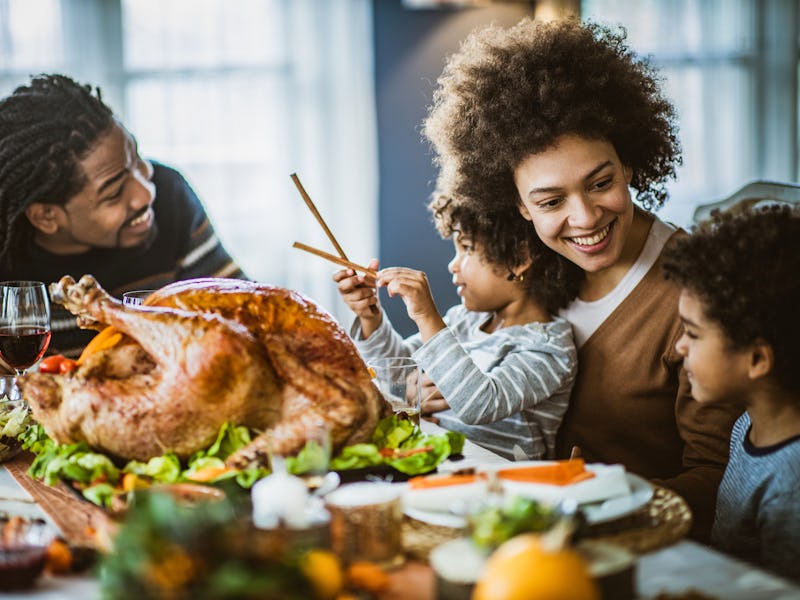When Is the “Right” Time To Eat Thanksgiving Dinner? An Endocrinologist Reveals the Inconvenient Answer
Heavy-duty eating has an effect on both our brains and our bodies.

It may be called Thanksgiving dinner, but families all over the country feast anytime between late morning and long after sunset. And for some, it's an all-day event. But heavy-duty eating has an effect on both our brains and our bodies, of course, including our metabolism, digestion, and even our sleep. Understanding this can help identify the most ideal Thanksgiving mealtime.
Along with eating, there’s a whole lot of planning, cooking, and travel that goes into Thanksgiving dinner. All of which can make picking an ideal eating time difficult. Fortunately, there are many healthy ways to enjoy the yearly feast, whether it’s an all-day buffet or a sit-down dinner after dark.
What happens to my body when I eat a lot?
We may enjoy a gorge fest, but the reality is giant meals are hard work for our bodies. Any large meal brings an influx of nutrients that elicit hormonal responses that affect how we feel, Steven Malin, a metabolism and endocrinology professor at Rutgers University, tells Inverse.
Any large meal raises blood sugar, which triggers a robust insulin response. Hormones like insulin, Malin tells Inverse, communicate to the brain to activate our sympathetic nervous system, which regulates heart rate and circulation in response to stress. This activation elevates our metabolism, so our bodies prepare to burn newly available calories in a process called thermogenesis.
As we continue eating, we produce compounds that let us know when we’re full. Eating to the point of fullness triggers the production of gut-derived hormones, which affect appetite and the desire to eat.
Overindulging can feel good, but all the food we take in sets off a chain reaction in our bodies that reverberates through every aspect of health.
How does a big meal late at night impact sleep?
Malin recommends planning a meal so that “you’re finishing up by 6:30 [pm] or so” if you plan to be in bed by 10 or 11 pm. This suggestion stems from the fact that a big meal has as much to do with sleep quality as hormone responses.
A huge repast often induces drowsiness. Contrary to popular belief, this tiredness isn’t because of turkey’s tryptophan but rather the result of a major blood sugar spike. We feel a more pronounced fatigue as it starts to drop. That said, heavy food intake isn’t a recommended pre-bedtime soporific. On the contrary, a nutrient-dense influx signals to our body that it’s going to be using those calories imminently, so we’d better wake up and prepare to burn some fuel.
Malin also emphasizes that with the end of daylight savings, earlier nightfall communicates to our circadian rhythm that we should start producing sleep hormone melatonin earlier, too. Packing in nutrients counteracts the message melatonin gives the body.
“It’s actually saying, ‘No, melatonin, we’re going to stay awake,’” he says. This further activates your metabolism, which isn’t conducive to a good night’s sleep.
More to the point, he underscores that “later meals generally have been associated with, in long-term epidemiological studies, poor health,” including hypertension, type 2 diabetes, cancer risks, and more. However, this risk correlates more with consistently eating late-night meals rather than one heavy-duty meal a year.
Malin also says that taking one’s personal chronology into account is important. For a night owl who consistently goes to sleep at 2 am, eating later isn’t necessarily a big deal.
With all this in mind, “eating these bigger meals earlier in the day might be better,” Malin says, offering between noon and 5 pm as a possible window.
Should I exercise on Thanksgiving?
No matter what time “dinner” starts, you’ll have surplus calories to burn, and Malin underscores that a little exercise goes hand in hand with feasting.
In fact, the question of what time to eat is inextricably tied to when to move your body — free time and capability pending. While eating for pleasure is fantastic, our bodies still need to convert all those nutrients into fuel that we ideally use up.
“As the body is exercising, it’s using those internal nutrients,” he says. “That food has a place to now go,” he says.
There’s always that family member who proclaims exercising before or after a big meal is important for losing or maintaining weight, but burning surplus calories is healthy for unrelated reasons, too. A flood of nutrients can increase fat and sugar levels in the bloodstream, which can harm our blood vessels if they linger. Excess calories can also cause a “traffic jam” for cells’ mitochondria, which are “doing everything [they] can to burn them up for fuel,” which could cause harmful oxidative stress and inflammation.
He adds that exercise early in the morning improves appetite perception, meaning your brain better registers fullness, which decreases overeating. Why this is, however, “isn’t 100 percent clear,” he says. However, the most important thing is getting some movement, whether it’s an early morning Turkey Trot 5K or a postprandial walk with the family and dog.
Really, he says, any kind of movement will do. “Maybe think about a little dance party in the house,” he says, also suggesting family games that encourage some movement. Even if you were on your feet cooking all morning, that brings some benefit.
If you celebrate this holiday with a nice healthy gorge as a family, that can be wonderful. Understanding its effect on your body can further help you make the best choices.
This article was originally published on